Refrigeration Cycle
Beginner’s Guide: Heat Pumps and Environmental Consequences

Dive into the world of **heat pumps** and discover their impact on our planet! If you’re eager to understand how these nifty gadgets can cool our homes in the summer and warm them up during the winter, all while being kinder to Mother Earth, you’ve hit the jackpot. By exploring the magic behind heat pumps, you’ll grasp why they’re a game-changer for folks looking to reduce their carbon footprint. Get ready to uncover some neat tricks and tips that aren’t common knowledge, making you the go-to expert among your friends. So, why keep reading? Because by the end, you’ll see precisely how switching to a heat pump can make a world of difference for our environment.
In this article, we will delve into the world of heat pumps, exploring their impact on the environment and the choices we can make for a more sustainable future.
From understanding the refrigeration cycle to exploring alternative refrigerants, we aim to provide you with valuable insights into the environmental benefits and drawbacks of heat pumps.
So, join us on this journey as we navigate the complexities of heat pump technology and its impact on our planet.

Key Takeaways
- Heat pumps transfer heat from one place to another.
- Heat pumps use refrigerants that can contribute to global warming, but newer alternatives have lower global warming potential.
- Heat pumps can release pollutants during operation, but implementing pollution control measures can help reduce emissions.
- Heat pumps offer cost-effective energy solutions, reduce carbon emissions, and can be integrated with renewable energy sources.
The Basics of Heat Pumps and Refrigeration Cycle
Let’s start by understanding the basics of how heat pumps work and their refrigeration cycle.
Heat pumps are a highly efficient heating and cooling system that transfers heat from one place to another. They consist of several key components, including the compressor, condenser, evaporator, and expansion valve.
The refrigeration cycle begins with the compressor, which increases the pressure and temperature of the refrigerant. As the refrigerant flows through the condenser, it releases heat to the surrounding air or water, depending on the type of heat pump.
The cooled refrigerant then enters the expansion valve, where it expands and cools further. Finally, it enters the evaporator, where it absorbs heat from the surrounding environment and transfers it to the indoor space.

Understanding these components and the heat pump installation process is essential for ensuring proper system operation and efficiency.
Understanding the Environmental Impact of Heat Pumps
Understanding the environmental impact of heat pumps involves considering their energy efficiency and greenhouse gas emissions. When it comes to heat pumps, there are several important factors to consider:
-
Refrigerant alternatives: Heat pumps use refrigerants to transfer heat. Traditional refrigerants, such as hydrofluorocarbons (HFCs), contribute to global warming. However, newer refrigerant alternatives, such as hydrofluoroolefins (HFOs), have a lower global warming potential and are more environmentally friendly.
-
Pollution control measures: Heat pumps can release pollutants during their operation, such as nitrogen oxides and particulate matter. Implementing pollution control measures, such as using filters and catalytic converters, can help reduce these emissions and minimize their environmental impact.

-
Proper installation and maintenance: Ensuring heat pumps are correctly installed and regularly maintained is crucial for maximizing their energy efficiency and minimizing their environmental impact. This includes proper refrigerant management and leak detection to prevent the release of harmful substances.
Understanding the environmental impact of heat pumps is essential for making informed choices. In the subsequent section, we’ll explore how energy efficiency makes heat pumps a sustainable choice.
Energy Efficiency and Heat Pumps: A Sustainable Choice
When considering energy efficiency and heat pumps, there are several key points to keep in mind.
First, heat pumps offer a cost-effective energy solution, allowing homeowners to save on their utility bills in the long run.
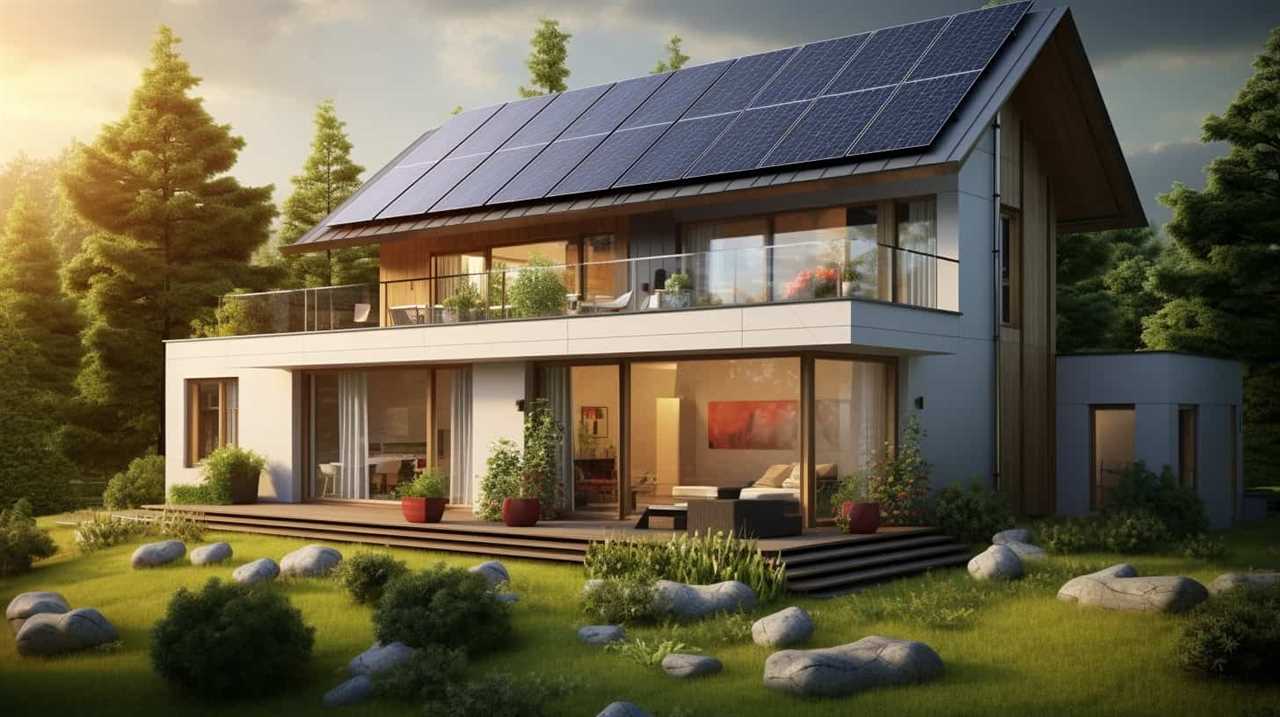
Second, these systems contribute to reduced carbon emissions, making them a more environmentally friendly choice compared to traditional heating and cooling methods.
Lastly, the long-term environmental benefits of heat pumps, such as their ability to use renewable energy sources, make them a sustainable option for heating and cooling homes.
Cost-Effective Energy Solution
We believe that investing in energy efficiency through the use of heat pumps is a highly cost-effective solution for sustainable energy consumption. Heat pumps provide several benefits that make them a practical choice for homeowners and businesses alike.
-
Cost benefit analysis: Heat pumps can significantly reduce energy costs compared to traditional heating and cooling systems. By using renewable energy sources such as the air or ground, heat pumps can provide efficient heating and cooling without relying heavily on electricity or fossil fuels.
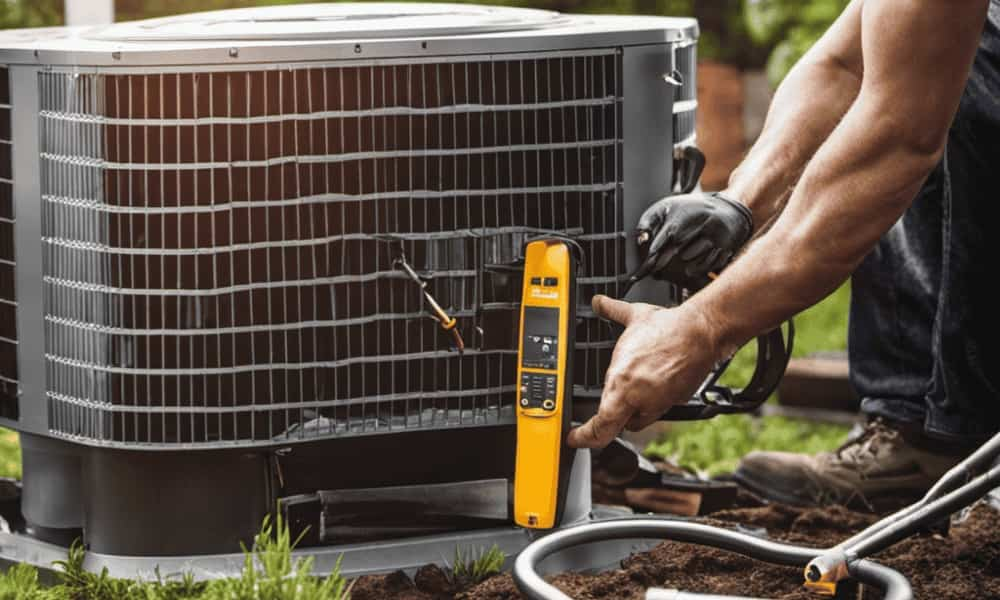
-
Renewable energy integration: Heat pumps can easily be integrated with renewable energy sources such as solar panels or wind turbines. This allows for a more sustainable and eco-friendly energy system, reducing our dependence on non-renewable resources.
-
Long-term savings: Although the initial cost of installing a heat pump may be higher, the long-term savings in energy bills can outweigh the upfront investment. Heat pumps have a longer lifespan compared to traditional systems, reducing the need for frequent replacements and repairs.
Investing in energy-efficient heat pumps not only provides cost savings but also contributes to reduced carbon emissions.
Reduced Carbon Emissions
By reducing reliance on fossil fuels, heat pumps contribute to the sustainable choice of reducing carbon emissions. Heat pumps are highly energy efficient, using electricity to transfer heat from the air, ground, or water sources to provide heating or cooling. This shift towards renewable energy integration has significant implications for reducing greenhouse gas emissions and mitigating climate change.

| Pros | Cons |
|---|---|
| – Lower carbon emissions | – High upfront cost |
| – Energy savings | – Limited space for installation |
| – Reduced dependence on fossil fuels | – Requires electricity |
| – Improved air quality | – Noise during operation |
| – Long lifespan | – Need for regular maintenance |
The benefits of heat pumps are not only limited to individual households, but also have wider policy implications. Governments and organizations are recognizing the potential of heat pumps to reduce carbon emissions and are incentivizing their adoption through financial incentives and regulations. As we strive for a sustainable future, heat pumps offer a viable solution to reduce carbon emissions and transition to a cleaner and greener energy system.
Long-Term Environmental Benefits
Heat pumps provide a sustainable choice for long-term environmental benefits due to their energy efficiency. They offer several advantages that contribute to long-term cost effectiveness and environmental health:
-
Energy Efficiency: Heat pumps are highly efficient in converting energy into heat or cool air, resulting in lower energy consumption and reduced utility bills. This long-term cost effectiveness not only benefits individuals but also reduces strain on the overall energy grid.
-
Reduced Carbon Footprint: By using heat pumps, carbon emissions can be significantly reduced compared to traditional heating and cooling systems. This helps combat climate change and improve air quality, contributing to a healthier environment.

-
Renewable Energy Compatibility: Heat pumps can be powered by renewable energy sources such as solar or geothermal power. This further enhances their long-term environmental benefits by minimizing reliance on fossil fuels and promoting a cleaner energy mix.
The Role of Refrigerants in Heat Pump Environmental Consequences
The use of refrigerants plays a crucial role in the environmental consequences of heat pumps. When it comes to heat pump systems, refrigerant selection is a critical factor in determining their environmental impact. Some refrigerants, such as hydrochlorofluorocarbons (HCFCs) and chlorofluorocarbons (CFCs), have been found to have a significant negative impact on the ozone layer and contribute to global warming.
In response to these environmental concerns, governments around the world have implemented strict regulations on the use of certain refrigerants. These regulations aim to phase out the use of harmful refrigerants and promote the adoption of more environmentally friendly alternatives, such as hydrofluorocarbons (HFCs) and natural refrigerants.
It’s important for heat pump manufacturers and consumers to be aware of these regulations and make informed decisions when selecting refrigerants to minimize the environmental consequences of heat pumps.
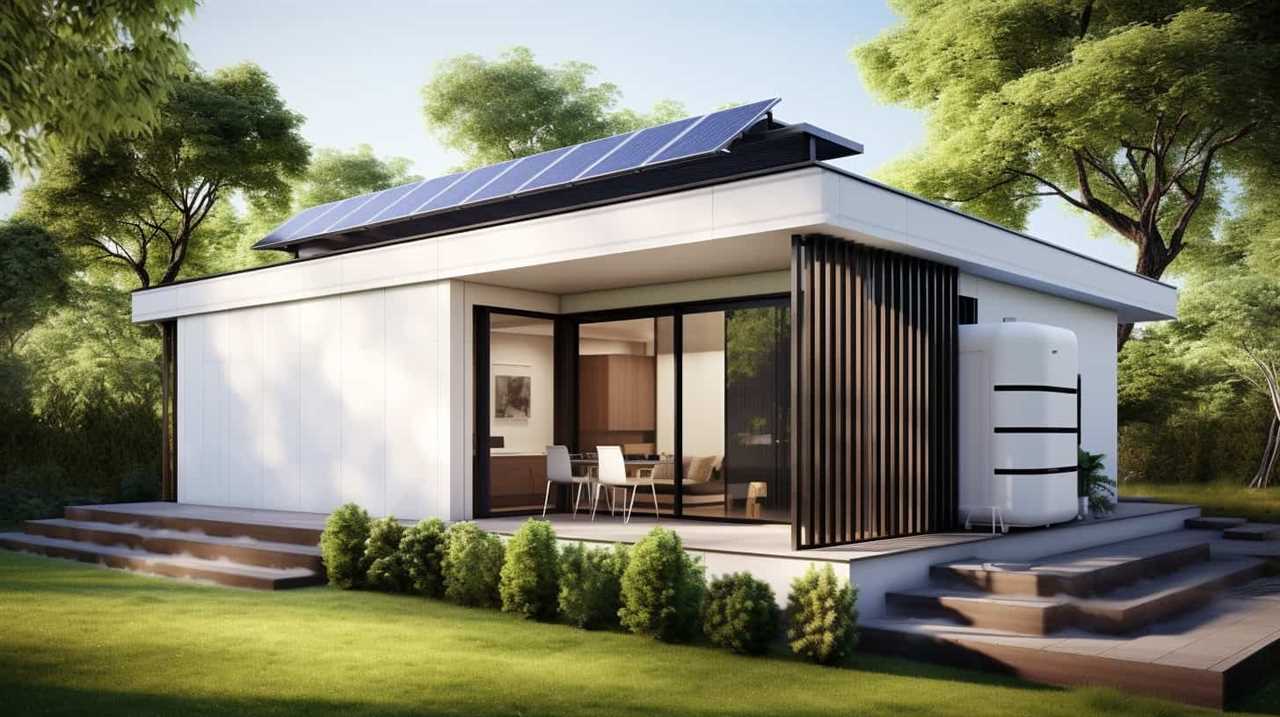
Exploring Alternative Refrigerants for Greener Heat Pumps
When considering greener heat pumps, we must explore alternative refrigerants to reduce environmental impact. Alternative refrigerants offer a sustainable heating solution that’s less harmful to the environment.
Here are three important considerations when exploring alternative refrigerants:
-
Non-HFC Refrigerants: Hydrofluorocarbons (HFCs) have high global warming potential, contributing to climate change. Alternative refrigerants, such as hydrofluoroolefins (HFOs), offer a more environmentally friendly option with significantly lower global warming potential.
-
Natural Refrigerants: Natural refrigerants, like ammonia and carbon dioxide, have gained popularity due to their low environmental impact. These refrigerants are non-toxic, non-flammable, and have zero ozone depletion potential. They not only minimize environmental harm but also provide excellent energy efficiency.
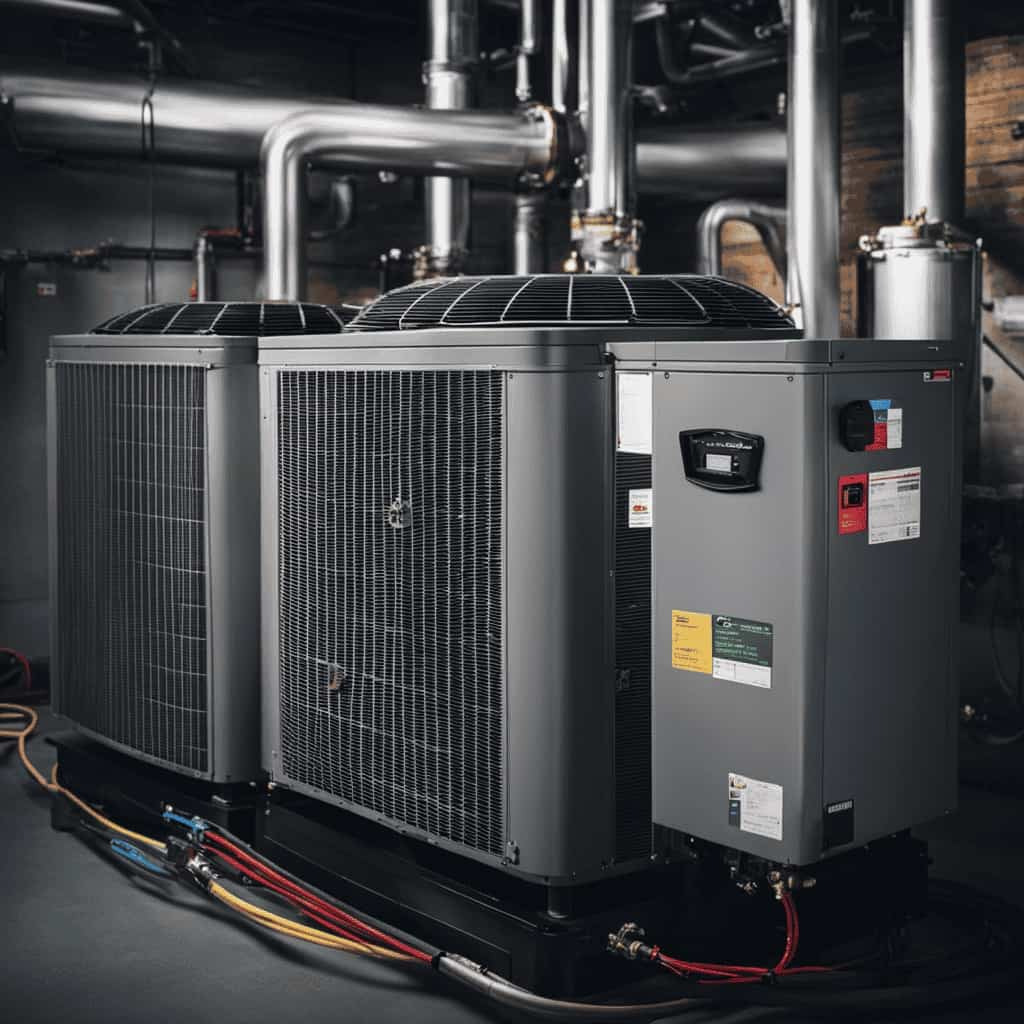
-
Blends and Mixtures: Blends of refrigerants can offer a balance between performance, energy efficiency, and environmental impact. Mixtures like hydrocarbon refrigerants are gaining attention for their high energy efficiency and low global warming potential.
Exploring alternative refrigerants is crucial for achieving greener heat pumps and reducing our environmental footprint. By choosing sustainable options, we can contribute to a healthier planet while enjoying efficient and effective heating solutions.
Assessing the Carbon Footprint of Heat Pump Systems
To accurately evaluate the environmental impact of heat pump systems, we need to assess their carbon footprint. Assessing the lifecycle of heat pump systems allows us to understand the overall energy consumption and greenhouse gas emissions associated with their manufacture, installation, operation, and end-of-life disposal. This analysis helps us identify areas where improvements can be made to reduce their carbon footprint.
One key aspect of assessing the carbon footprint of heat pump systems is conducting an energy consumption analysis. This involves evaluating the amount of electricity consumed by the heat pump during its operation. By measuring the energy input and comparing it to the heat output, we can determine the energy efficiency of the system. A more efficient heat pump will have a lower carbon footprint as it requires less electricity to generate the same amount of heat.

In addition, considering the lifecycle of heat pump systems allows us to identify opportunities for reducing their carbon footprint. This includes using materials that have a lower environmental impact, such as refrigerants with lower global warming potential, as discussed in a previous subtopic. Proper disposal and recycling of heat pump components at the end of their life is also crucial to minimizing their overall environmental impact.
Assessing the carbon footprint of heat pump systems is essential for making informed decisions about their adoption and for identifying areas for improvement. By conducting a thorough energy consumption analysis and considering the lifecycle of these systems, we can work towards reducing their environmental consequences and promoting more sustainable heating and cooling solutions.
Potential Air and Water Pollution From Heat Pump Operation
How can heat pump operation potentially contribute to air and water pollution?
-
Refrigerant leaks: Heat pumps rely on refrigerants to transfer heat. If there’s a leak in the system, these refrigerants can escape into the atmosphere and contribute to air pollution. Some refrigerants, such as hydrofluorocarbons (HFCs), have a high global warming potential, exacerbating their environmental impact.
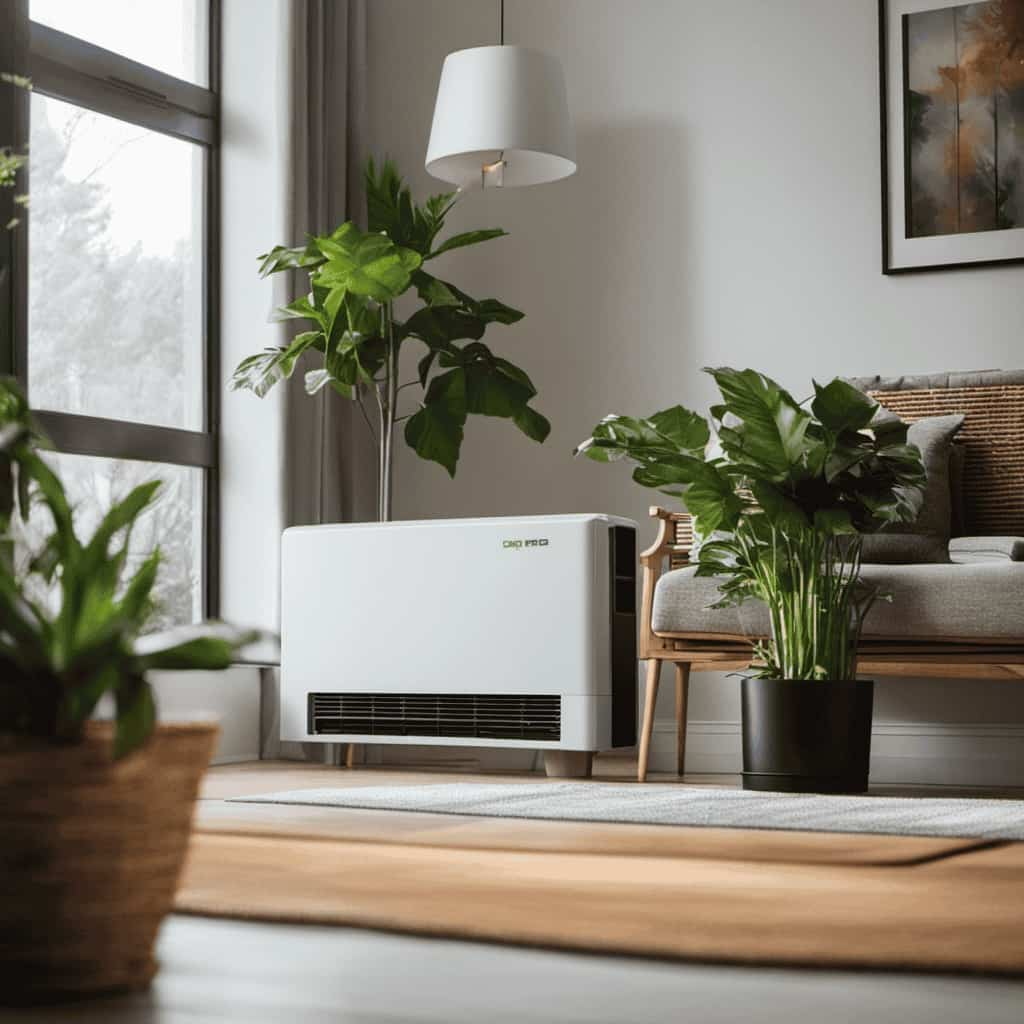
-
Discharge of wastewater: Heat pumps extract heat from water sources, such as rivers or lakes. During this process, water is pumped into the heat exchanger and then discharged back into the source. If this water isn’t properly treated, it can contain pollutants or excess heat, leading to water pollution and harming aquatic ecosystems.
-
Energy source emissions: Heat pumps require electricity to operate. Depending on the source of this electricity, there can be emissions associated with its generation, such as carbon dioxide from fossil fuel power plants. These emissions contribute to air pollution and can negate some of the environmental benefits of using a heat pump.
It is crucial to address these potential sources of air and water pollution associated with heat pump operation to ensure that the environmental consequences are minimized.
Heat Pump Disposal and End-of-Life Environmental Concerns
Proper disposal and recycling are essential to mitigate the environmental impact of heat pumps reaching the end of their lifespan. Heat pump recycling and responsible disposal play a crucial role in reducing the negative consequences on the environment. When heat pumps are disposed of improperly, they can release harmful refrigerants and other pollutants into the atmosphere, leading to air pollution and ozone depletion.
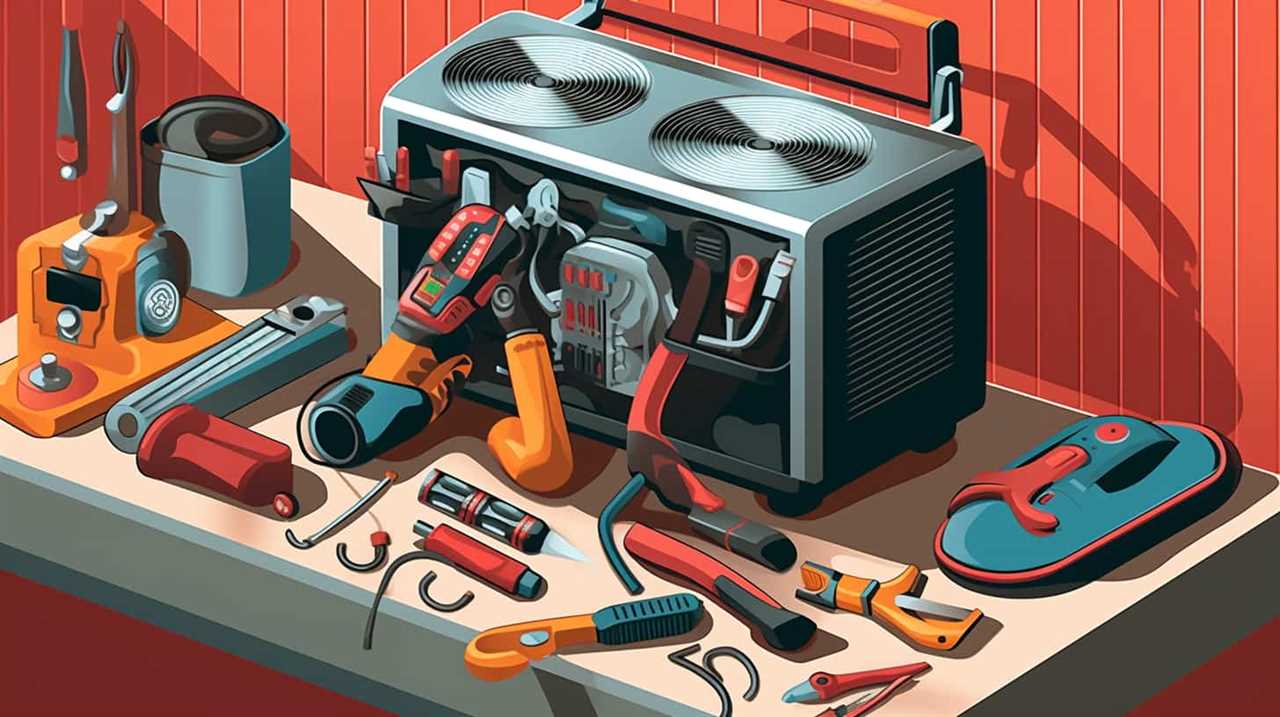
Additionally, the improper disposal of heat pumps can result in the release of toxic materials, such as mercury and lead, which can contaminate soil and water sources. Therefore, it’s important to ensure that heat pumps are recycled or disposed of responsibly, following established guidelines and regulations. By doing so, we can minimize the environmental impact and contribute to a more sustainable future.
Now that we’ve discussed the importance of proper heat pump disposal, let’s shift our focus to the next section: the importance of proper heat pump maintenance for sustainability.
The Importance of Proper Heat Pump Maintenance for Sustainability
Ensuring regular maintenance and timely inspections are essential to sustain the efficiency and longevity of heat pumps. Neglecting proper maintenance can lead to decreased performance, increased energy consumption, and costly repairs.
To maintain the sustainability of heat pumps, it’s crucial to follow specific heat pump maintenance techniques and adopt sustainable maintenance practices. Here are three important practices to consider:
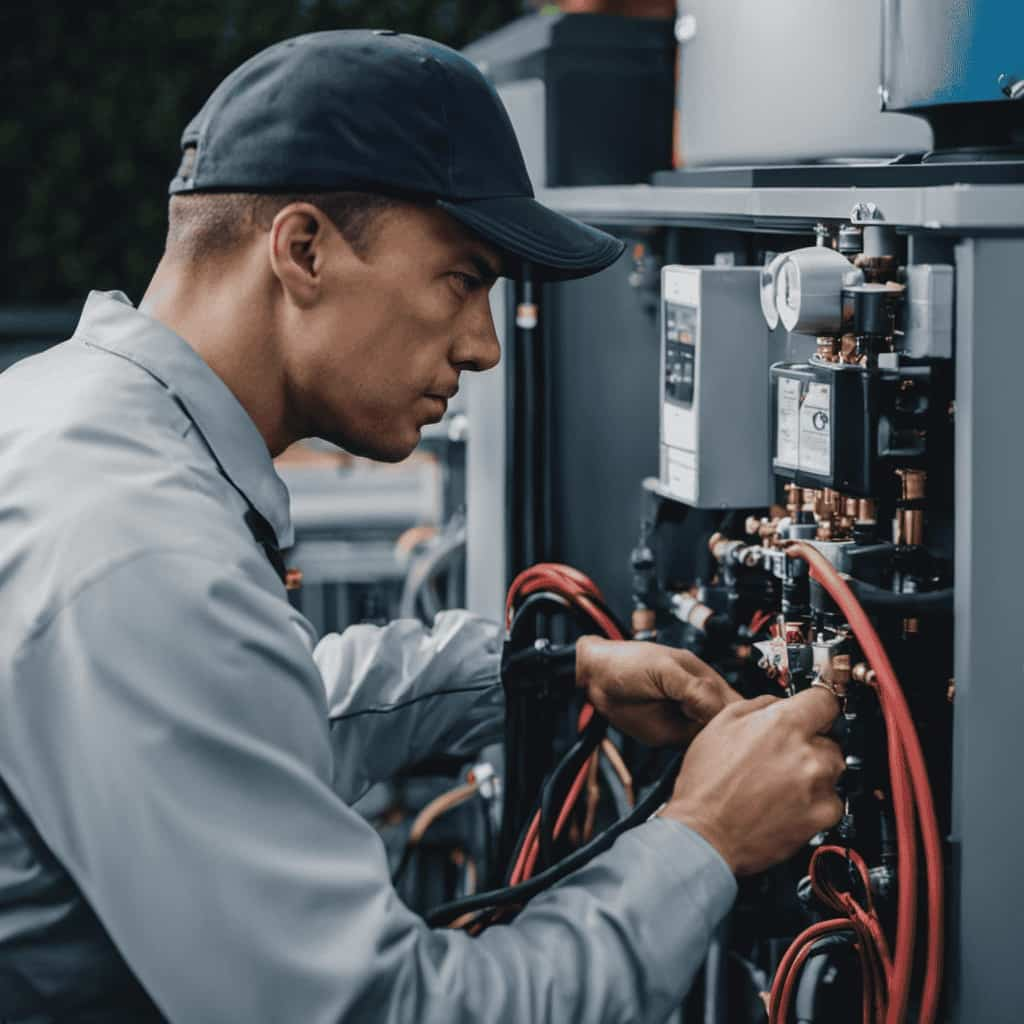
-
Regular cleaning: Dust, dirt, and debris can accumulate on the heat pump’s components, hindering its performance. Regularly cleaning the filters, coils, and outdoor unit can help maintain optimal efficiency.
-
Lubrication: Proper lubrication of moving parts, such as fan motors and bearings, reduces friction and wear, ensuring smooth operation and preventing premature breakdowns.
-
Inspection and tune-ups: Periodic inspections by a qualified technician can identify any potential issues and address them promptly. Tune-ups, including checking refrigerant levels, electrical connections, and overall system performance, help maintain the efficiency and longevity of the heat pump.
Balancing the Environmental Benefits and Drawbacks of Heat Pumps
When considering the environmental impact of heat pumps, there are several points to consider.

One important aspect is the trade-off between energy efficiency and emissions reduction potential. While heat pumps are more energy efficient than traditional heating systems, they still rely on electricity, which may be generated from non-renewable sources.
Additionally, proper disposal methods for old or malfunctioning heat pumps must be considered to minimize their environmental impact.
Energy Efficiency Trade-Offs
We must consider the energy efficiency trade-offs of heat pumps in order to balance the environmental benefits and drawbacks. When evaluating the energy efficiency of heat pumps, there are several factors to consider:
-
Initial Cost: Heat pumps can have a higher upfront cost compared to traditional heating and cooling systems. However, the long-term energy savings can offset this initial investment.
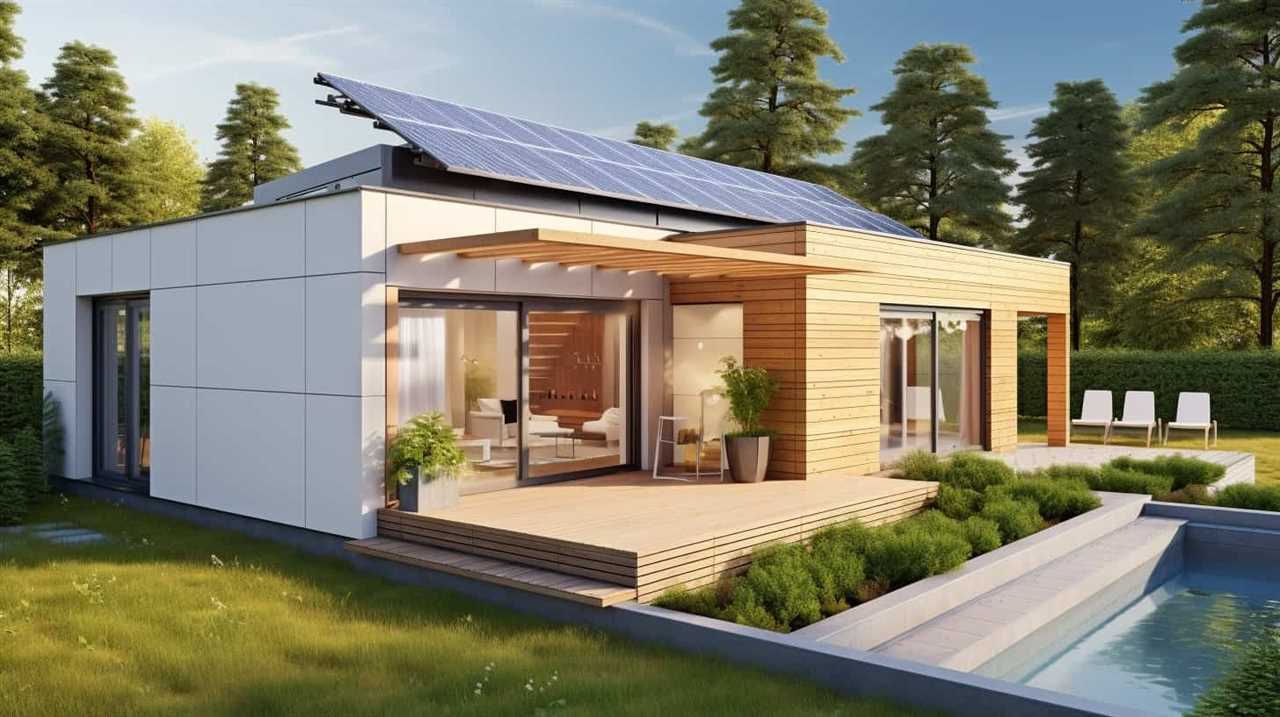
-
Operating Costs: Heat pumps are generally more energy efficient than traditional systems, resulting in lower monthly energy bills. However, the actual savings will depend on factors such as climate, insulation, and usage patterns.
-
Environmental Impact: Heat pumps reduce greenhouse gas emissions by using renewable energy sources. However, the manufacturing and disposal processes of heat pumps can have an environmental impact that needs to be assessed.
Emissions Reduction Potential
To fully understand the emissions reduction potential of heat pumps, we need to assess both the environmental benefits and drawbacks they present.
Heat pumps offer significant opportunities for reducing greenhouse gas emissions and improving air quality compared to traditional heating and cooling systems. By transferring heat rather than generating it, heat pumps can achieve higher energy efficiency and lower carbon emissions.

However, it’s important to consider the source of electricity powering the heat pump, as this can impact the overall emissions reduction. Additionally, the production and disposal of heat pumps can have environmental consequences, highlighting the need for proper waste management and recycling practices.
These considerations have important implications for emissions reduction strategies and environmental policy.
Now, let’s explore the proper disposal methods for heat pumps.
Proper Disposal Methods
As we consider the environmental benefits and drawbacks of heat pumps, it’s essential to explore proper disposal methods. Heat pump recycling and responsible waste management are crucial for minimizing the environmental impact of these systems. Here are three key considerations:
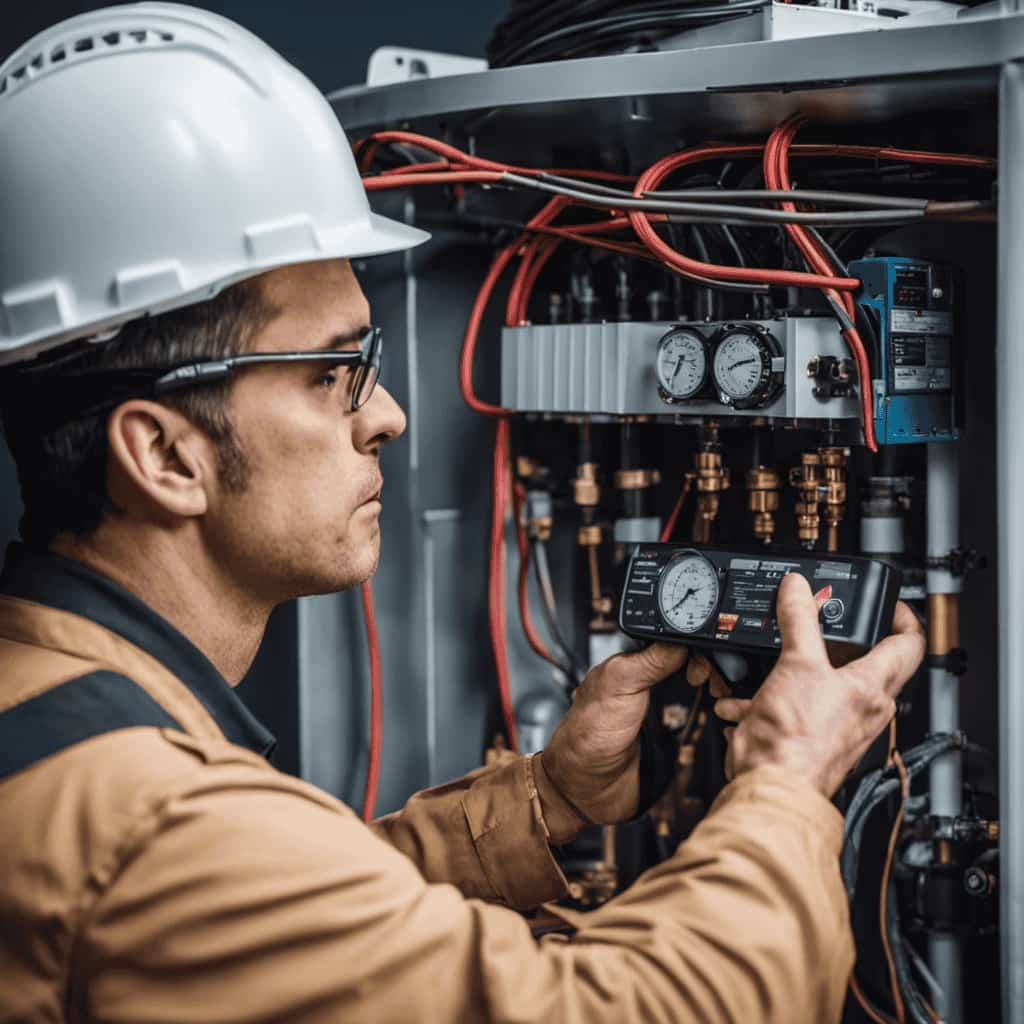
-
Recycling programs: Many regions have established recycling programs specifically for heat pumps. These programs ensure that the components and materials of old heat pumps are properly disassembled and recycled, reducing the amount of waste that ends up in landfills.
-
Certified disposal facilities: It’s important to ensure that heat pumps are disposed of at certified facilities that adhere to responsible waste management practices. These facilities are equipped to handle the safe disposal of heat pumps and prevent any potential harm to the environment.
-
Manufacturer take-back programs: Some heat pump manufacturers offer take-back programs, where they take responsibility for the proper disposal of their products. These programs ensure that heat pumps are recycled or disposed of in an environmentally responsible manner.
Frequently Asked Questions
How Much Does a Heat Pump Cost to Install and Operate?
Installing and operating a heat pump can vary in cost. Factors such as the size of the unit, installation requirements, and energy efficiency affect the overall expense. It’s important to compare costs and consider long-term savings from improved energy efficiency.

Are There Any Government Incentives or Rebates Available for Purchasing and Installing a Heat Pump?
Yes, there are government incentives and heat pump rebates available for purchasing and installing a heat pump. These incentives can help reduce the initial cost and make it more affordable for homeowners.
Can a Heat Pump Be Used in All Climates and Regions?
Yes, a heat pump can be used in all climates and regions. However, its efficiency may vary depending on factors such as temperature extremes and the impact on the electricity grid.
Are There Any Health Concerns Associated With Heat Pump Use?
There are some health concerns associated with heat pump use, such as poor indoor air quality if not properly maintained. However, with regular maintenance, heat pumps can provide health benefits by improving air circulation and reducing allergens in the home.
How Long Does a Heat Pump Typically Last Before It Needs to Be Replaced?
Heat pumps typically last around 15-20 years before needing replacement. Regular heat pump maintenance, such as changing air filters and cleaning coils, can help extend their lifespan. Signs of a failing heat pump include reduced heating or cooling capacity and unusual noises.
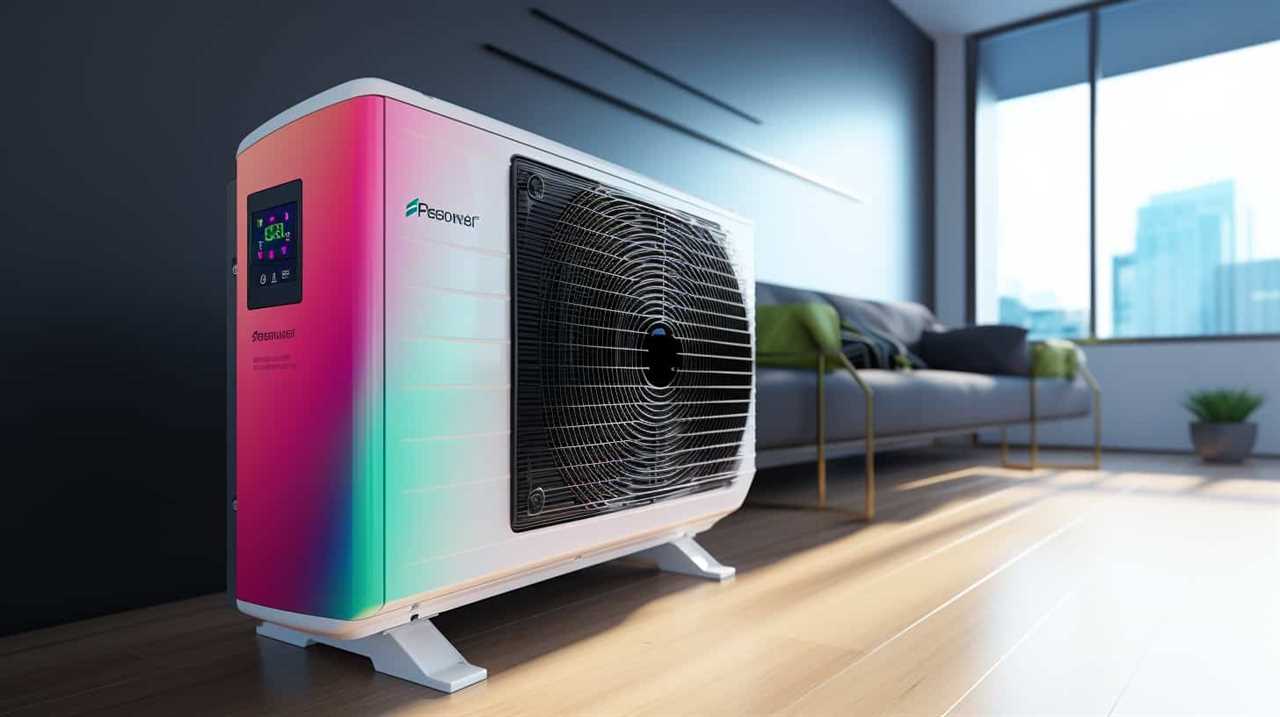
Conclusion
In conclusion, heat pumps offer an eco-friendly solution for heating and cooling. While they may have some environmental consequences, such as the use of certain refrigerants and potential pollution, there are also ways to mitigate these issues.
By choosing energy-efficient models, exploring greener refrigerants, practicing proper maintenance, and considering the overall benefits, we can strike a balance between sustainability and comfort.
So, let’s embrace heat pumps as a smart choice for a greener future.
Refrigeration Cycle
High-Efficiency HVAC Systems: Heat Pump Breakthroughs Revealed
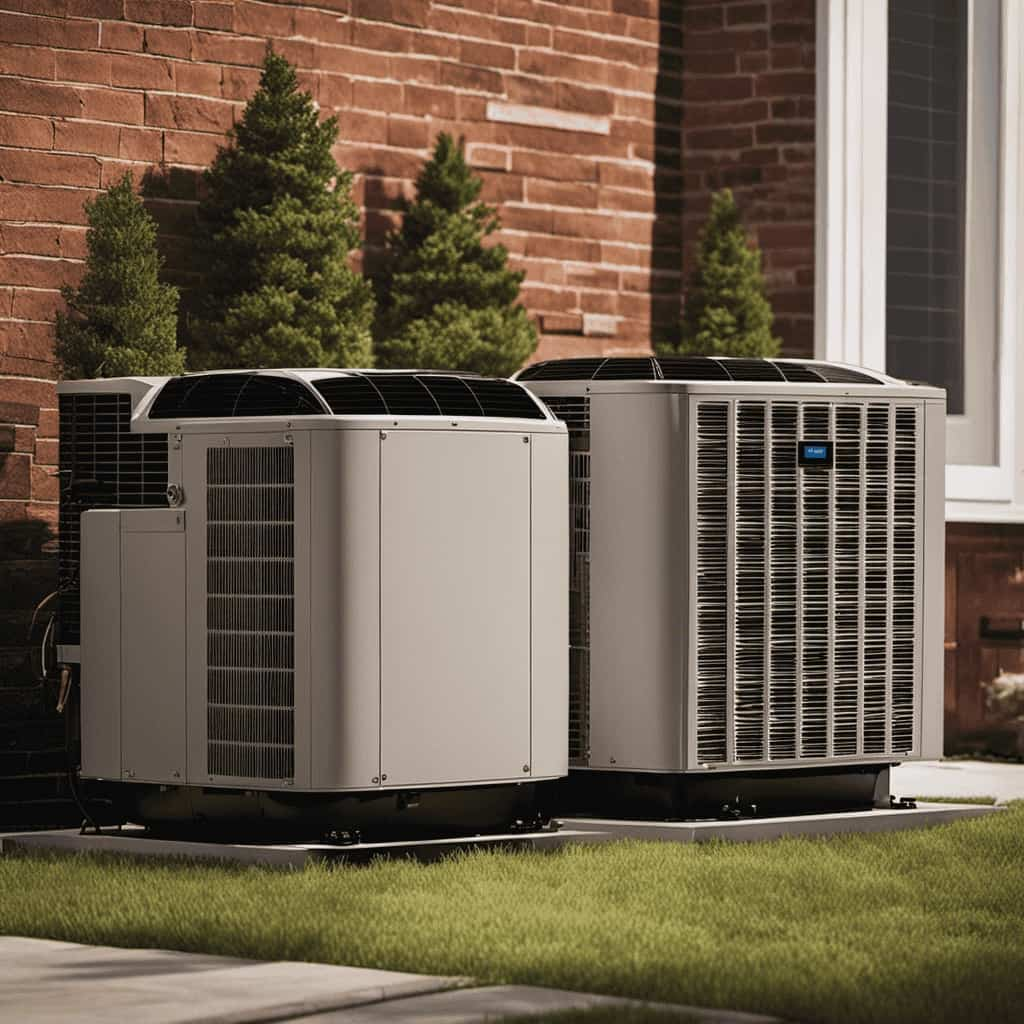
We are excited to announce the newest advancements in high-efficiency HVAC systems.
Picture this: heat pumps that revolutionize energy efficiency, like a cool breeze on a scorching summer day.
In this article, we will delve into the world of heat pump technology, uncovering the key factors that contribute to their efficiency.
Stay tuned as we explore the cutting-edge innovations that make upgrading to a high-efficiency HVAC system a game-changer for your home.
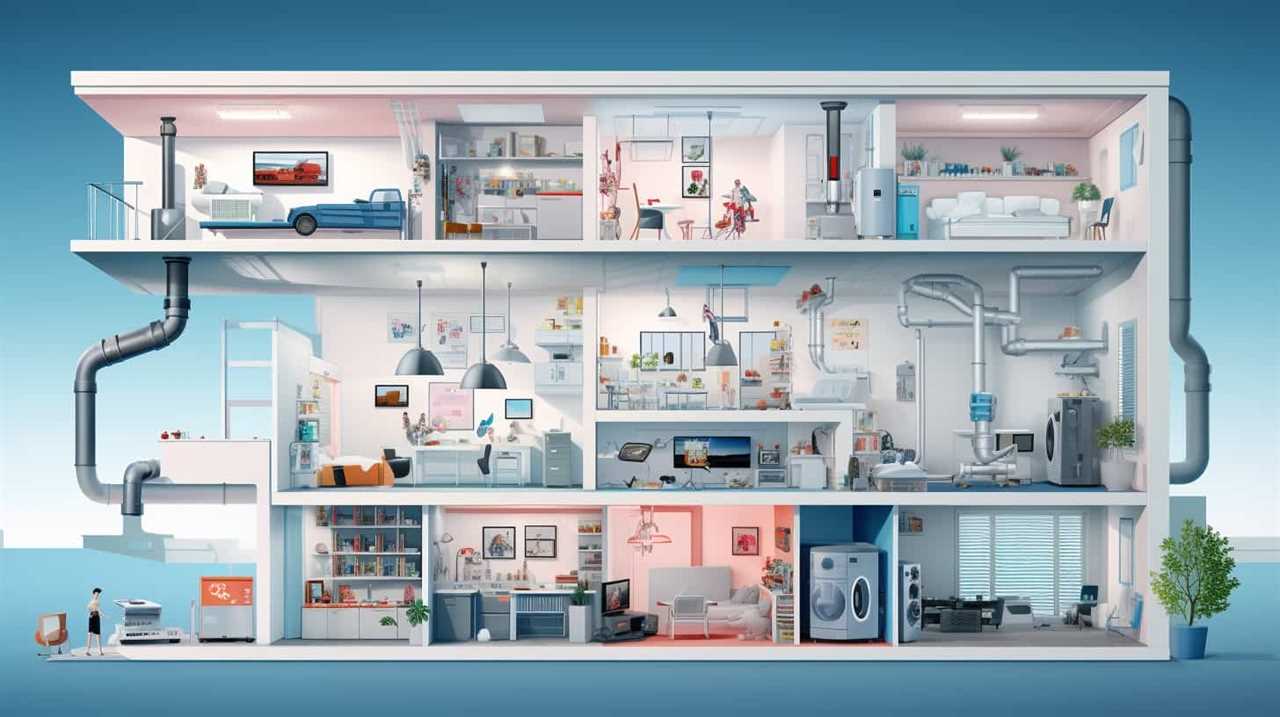
Get ready to liberate your energy consumption!
Key Takeaways
- High-efficiency HVAC systems optimize energy usage and provide superior comfort.
- Regular maintenance, such as cleaning air filters and inspecting ductwork, ensures optimal performance.
- Upgrading to a high-efficiency HVAC system provides optimal comfort while reducing energy consumption and costs.
- The integration of advanced technologies in high-efficiency HVAC systems enhances overall performance and user experience.
Overview of High-Efficiency HVAC Systems
As we delve into the topic of high-efficiency HVAC systems, let’s start by providing an overview of these innovative heating, ventilation, and air conditioning systems.
High-efficiency HVAC systems are designed to optimize energy usage and provide superior comfort in residential and commercial spaces.
One key aspect of maintaining these systems is regular HVAC system maintenance. This includes cleaning or replacing air filters, checking and sealing ductwork, and inspecting and cleaning the outdoor unit.

By properly maintaining your HVAC system, you can ensure its optimal performance and longevity.
Additionally, implementing energy-saving tips can further enhance the efficiency of these systems. Simple steps such as adjusting the thermostat, sealing air leaks, and using ceiling fans can significantly reduce energy consumption and lower utility bills.
Understanding Heat Pump Technology
Let’s dive into the inner workings of heat pump technology and understand how it functions to efficiently heat and cool your space.
Heat pump operation relies on two essential heat transfer mechanisms:
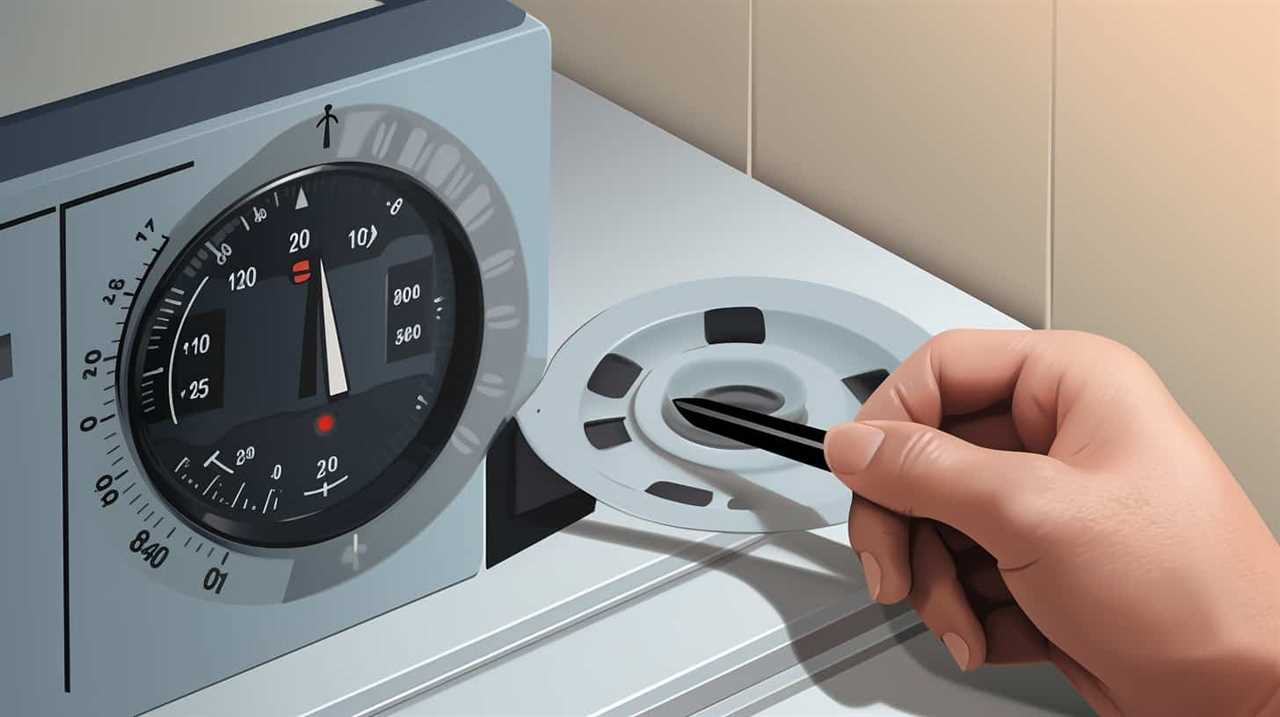
-
Refrigerant: Heat pumps utilize a refrigerant, a substance that can change from a gas to a liquid and vice versa at low temperatures. This refrigerant is responsible for absorbing and releasing heat energy throughout the system.
-
Evaporation and Condensation: The refrigerant evaporates at a low temperature, absorbing heat from the surrounding air or ground. It then undergoes compression, raising its temperature and pressure. Next, it condenses, releasing the absorbed heat to the space being heated.
-
Reversing Valve: The heat pump can change the direction of refrigerant flow using a reversing valve, allowing it to switch between heating and cooling modes.
-
Compressor: The compressor is responsible for increasing the pressure and temperature of the refrigerant, ensuring efficient heat transfer.

-
Heat Exchanger: Heat pumps have two heat exchangers, one indoor and one outdoor. These devices facilitate the transfer of heat between the refrigerant and the air or ground.
Key Factors for Heat Pump Energy Efficiency
We can achieve optimal heat pump energy efficiency by considering key factors such as proper sizing, regular maintenance, and effective insulation.
Heat pump maintenance is crucial for ensuring its peak performance and longevity. Regularly cleaning or replacing air filters is a simple yet effective way to improve energy efficiency. Additionally, scheduling professional maintenance checks at least once a year can help identify and address any potential issues before they become major problems.
Another important factor is effective insulation. Properly insulating your home can prevent heat loss during winter and heat gain during summer, reducing the workload on your heat pump and saving energy.
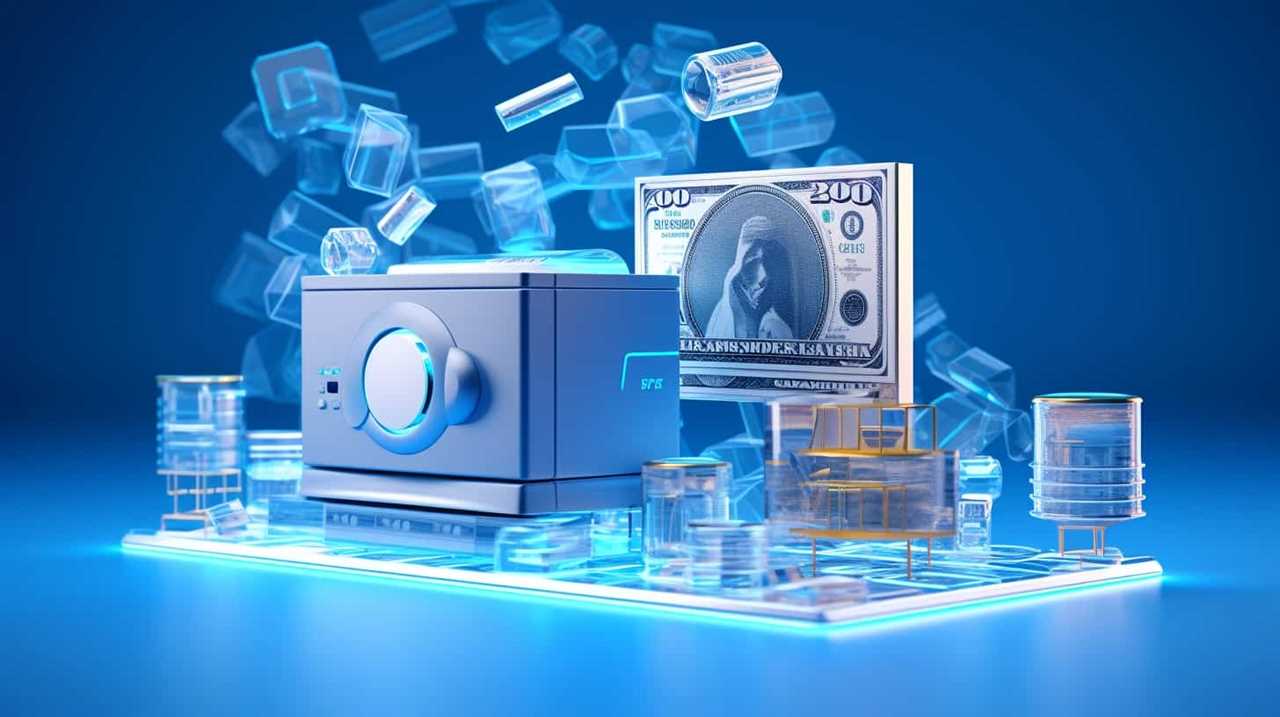
Latest Innovations in High-Efficiency Heat Pumps
Our research has uncovered several exciting breakthroughs in high-efficiency heat pumps that are revolutionizing the HVAC industry. These innovations are driving energy efficiency and providing greater comfort and control for consumers.
Here are five key advancements in high-efficiency heat pumps:
-
Advancements in heat pump compressors: New compressor designs, such as variable speed and scroll compressors, are improving the overall efficiency of heat pumps by allowing them to adjust their output based on the heating and cooling demands.
-
Integration of smart technology: High-efficiency heat pumps now come equipped with smart features that enable users to control and monitor their HVAC systems remotely. This integration allows for optimized energy usage and personalized comfort settings.

-
Enhanced refrigerant technology: The development of new refrigerants with lower global warming potential (GWP) has significantly reduced the environmental impact of high-efficiency heat pumps.
-
Improved defrosting capabilities: Heat pumps now have advanced defrosting algorithms that optimize defrost cycles, reducing energy waste and improving system performance in cold climates.
-
Enhanced system diagnostics: High-efficiency heat pumps are equipped with advanced diagnostic tools that can detect and troubleshoot system issues, allowing for faster and more accurate repairs.
These innovations in high-efficiency heat pumps are making HVAC systems more efficient, reliable, and user-friendly, leading to energy savings and improved comfort for consumers.
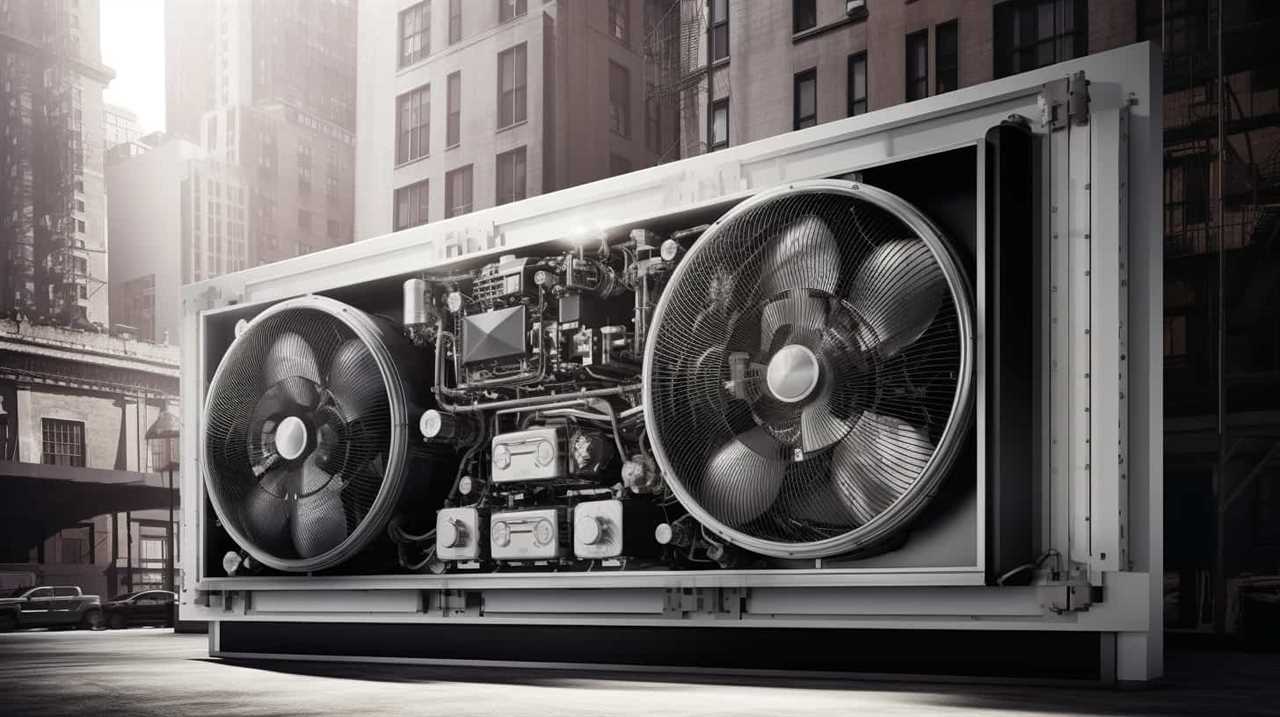
Benefits of Upgrading to a High-Efficiency HVAC System
Upgrading to a high-efficiency HVAC system offers homeowners significant energy savings and improved indoor comfort. These systems are designed to operate more efficiently, resulting in lower energy consumption and reduced utility bills. By utilizing advanced technologies such as variable-speed motors and smart thermostats, high-efficiency HVAC systems can adapt to the specific needs of a home, providing precise temperature control and optimal energy usage. The environmental impact of upgrading to a high-efficiency system should also be considered. These systems consume less energy, which reduces greenhouse gas emissions and helps conserve natural resources. Additionally, some high-efficiency HVAC systems use eco-friendly refrigerants that have a lower impact on the ozone layer. Overall, upgrading to a high-efficiency HVAC system not only benefits homeowners financially but also contributes to a greener and more sustainable future.
| Benefits | Energy Savings | Environmental Impact |
|---|---|---|
| Lower utility bills | Reduced energy consumption | Reduced greenhouse gas emissions |
| Improved comfort | Precise temperature control | Conservation of natural resources |
| Advanced technologies | Optimal energy usage | Use of eco-friendly refrigerants |
Frequently Asked Questions
Are High-Efficiency HVAC Systems More Expensive to Install Than Traditional Systems?
High efficiency HVAC system installation costs can be higher than traditional systems initially, but in the long run, they can save money due to lower energy consumption. Additionally, high efficiency systems tend to have a longer lifespan.
Can a High-Efficiency Heat Pump Be Used in Both Heating and Cooling Modes?
Yes, a high-efficiency heat pump can be used in both heating and cooling modes. It offers energy efficiency benefits and reduces the environmental impact. This breakthrough technology is a game-changer for HVAC systems.
How Long Does It Typically Take for a High-Efficiency HVAC System to Pay for Itself Through Energy Savings?
Typically, the payback period for a high-efficiency HVAC system through energy savings varies. It depends on factors such as the initial cost, energy prices, and usage patterns. However, over time, these systems can help recoup their cost through lower energy bills.
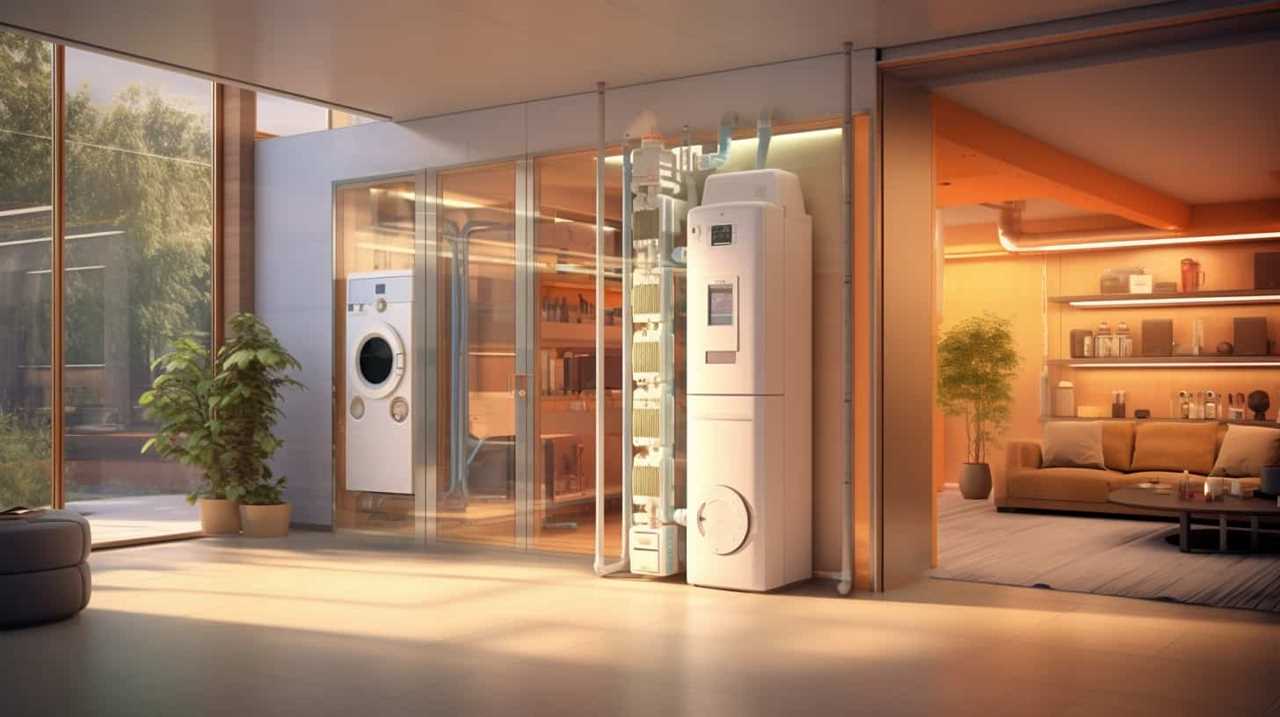
Are There Any Government Incentives or Tax Credits Available for Upgrading to a High-Efficiency HVAC System?
Yes, there are government incentives and tax credits available for upgrading to a high-efficiency HVAC system. These incentives and credits can help offset the cost of installation and make the upgrade more affordable.
Can a High-Efficiency Heat Pump Be Used in Conjunction With a Traditional Furnace for Backup Heating During Extremely Cold Temperatures?
Yes, a high-efficiency heat pump can be used in conjunction with a traditional furnace for backup heating during extremely cold temperatures. This provides the advantages of geothermal heating and the reliability of a traditional furnace.
Conclusion
In conclusion, upgrading to a high-efficiency HVAC system with the latest innovations in heat pump technology can greatly improve energy efficiency and reduce utility costs. These breakthroughs in heat pump technology allow for better heat transfer and more precise temperature control, resulting in optimal comfort and savings.
So, why not take the leap and embrace the new era of high-efficiency HVAC systems? It’s time to reap the benefits and make your home a haven of efficiency and comfort. After all, ‘out with the old, in with the new’!

Refrigeration Cycle
3 Key Comparisons: Heat Pumps Vs Traditional Heating

Welcome, ladies and gentlemen, to our evaluation comparing heat pumps with traditional heating systems.
Today, we embark on a journey where facts will illuminate the path towards informed decision making. Join us as we delve into the realm of energy efficiency, cost effectiveness, and environmental impact.
With these key comparisons, we aim to shed light on the benefits and drawbacks of each option, empowering you to make a choice that aligns with your values and desires for a greener future.
Let’s begin.
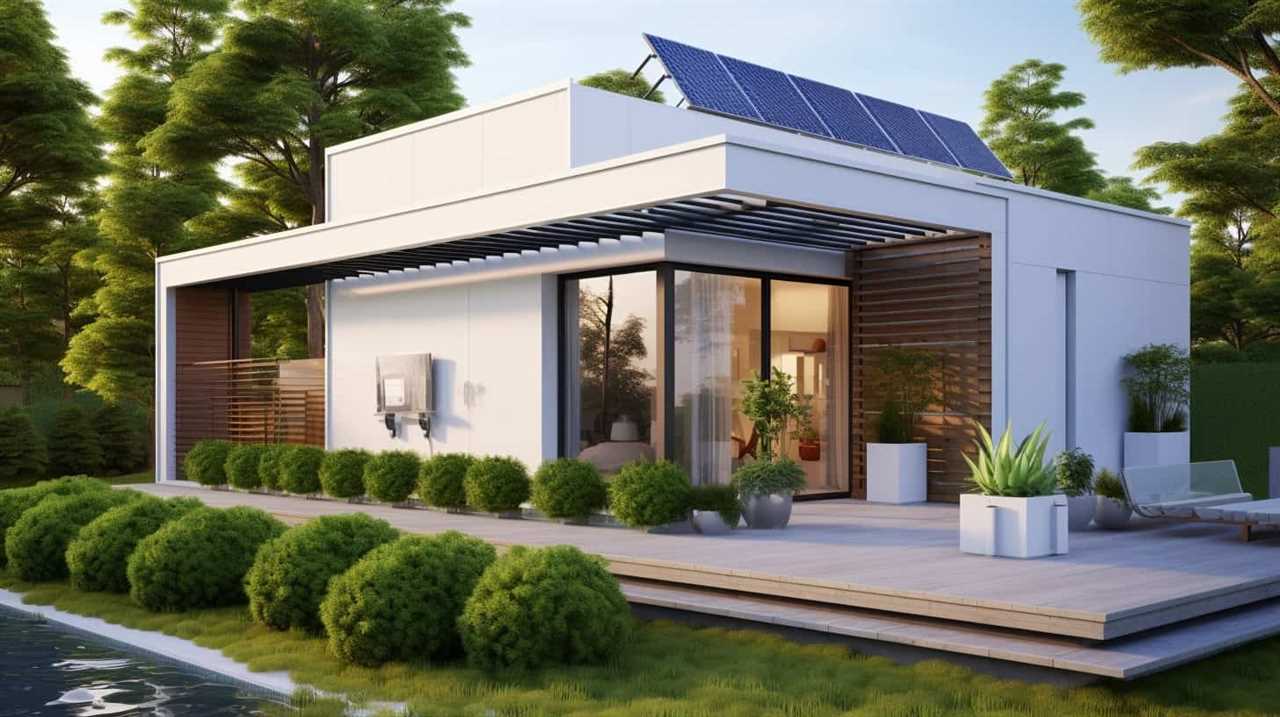
Key Takeaways
- Heat pumps are more energy efficient than traditional heating systems.
- Heat pumps reduce carbon emissions and contribute to a greener future.
- Heat pumps provide efficient and effective heating and cooling solutions.
- Heat pumps can be powered by renewable energy sources.
Energy Efficiency Comparison
When comparing heat pumps to traditional heating systems, we find that heat pumps are more energy efficient. Heat pump technology utilizes the principles of refrigeration to transfer heat from one space to another.
Unlike traditional heating systems that generate heat by burning fuel, heat pumps extract heat from the air, ground, or water sources, making them more energy efficient. This energy efficiency leads to significant energy savings for homeowners and businesses.
Heat pumps can provide up to four times the amount of energy they consume, resulting in lower energy bills and reduced carbon emissions. By harnessing the natural heat available in the environment, heat pump technology offers a sustainable and cost-effective solution for heating and cooling needs.
Cost Comparison
In terms of cost, heat pumps offer a more budget-friendly option compared to traditional heating systems. One of the main advantages of heat pumps is their long-term savings potential. While the initial installation cost of a heat pump may be higher than that of a traditional heating system, the energy savings over time can offset this initial investment.

Heat pumps are highly energy efficient, as they transfer heat rather than generate it, resulting in lower energy consumption and reduced utility bills. Additionally, heat pumps require less maintenance compared to traditional heating systems, resulting in lower maintenance expenses over time. This further contributes to the cost-effectiveness of heat pumps.
Environmental Impact Comparison
Using heat pumps instead of traditional heating systems can significantly reduce our environmental impact while still providing efficient and effective heating.
The environmental benefits of heat pumps are evident when considering carbon footprint analysis and the integration of renewable energy.
-
Carbon footprint analysis:

-
Heat pumps utilize electricity to transfer heat, resulting in lower carbon emissions compared to fossil fuel-based heating systems.
-
Traditional heating systems, such as gas or oil furnaces, release greenhouse gases that contribute to climate change.
-
By choosing heat pumps, we can reduce our carbon footprint and help mitigate the effects of global warming.
-
Renewable energy integration:

-
Heat pumps can be powered by renewable energy sources like solar or wind power.
-
This integration promotes the use of clean and sustainable energy, reducing our reliance on fossil fuels.
-
By harnessing renewable energy for heat pumps, we can further minimize our environmental impact and contribute to a greener future.
Frequently Asked Questions
How Does the Installation Process of a Heat Pump Compare to That of a Traditional Heating System?
The installation process of a heat pump compared to that of a traditional heating system is more complex and requires professional expertise. However, once installed, heat pumps have lower maintenance requirements and provide greater energy efficiency.

Are There Any Specific Maintenance Requirements for Heat Pumps That Differ From Traditional Heating Systems?
When it comes to maintenance requirements, heat pumps differ from traditional heating systems. While the installation process may be similar, heat pumps require regular cleaning of filters and coils, as well as periodic inspections for optimal performance.
Can a Heat Pump Be Used in Conjunction With a Traditional Heating System to Maximize Efficiency?
Yes, a heat pump can be used in conjunction with a traditional heating system to maximize efficiency. By utilizing the heat pump’s efficiency and the traditional system’s capabilities, we can achieve optimal heating performance.
What Are the Noise Levels Typically Associated With Heat Pumps Compared to Traditional Heating Systems?
What are the noise levels typically associated with heat pumps compared to traditional heating systems? Are heat pumps quieter? Noise levels vary, but heat pumps generally operate at lower decibel levels, making them a quieter option for energy-efficient heating.
Are There Any Government Incentives or Tax Credits Available for Installing a Heat Pump Versus a Traditional Heating System?
There are government incentives and tax credits available for installing a heat pump compared to a traditional heating system. These incentives can help offset the cost and make it more affordable for homeowners.
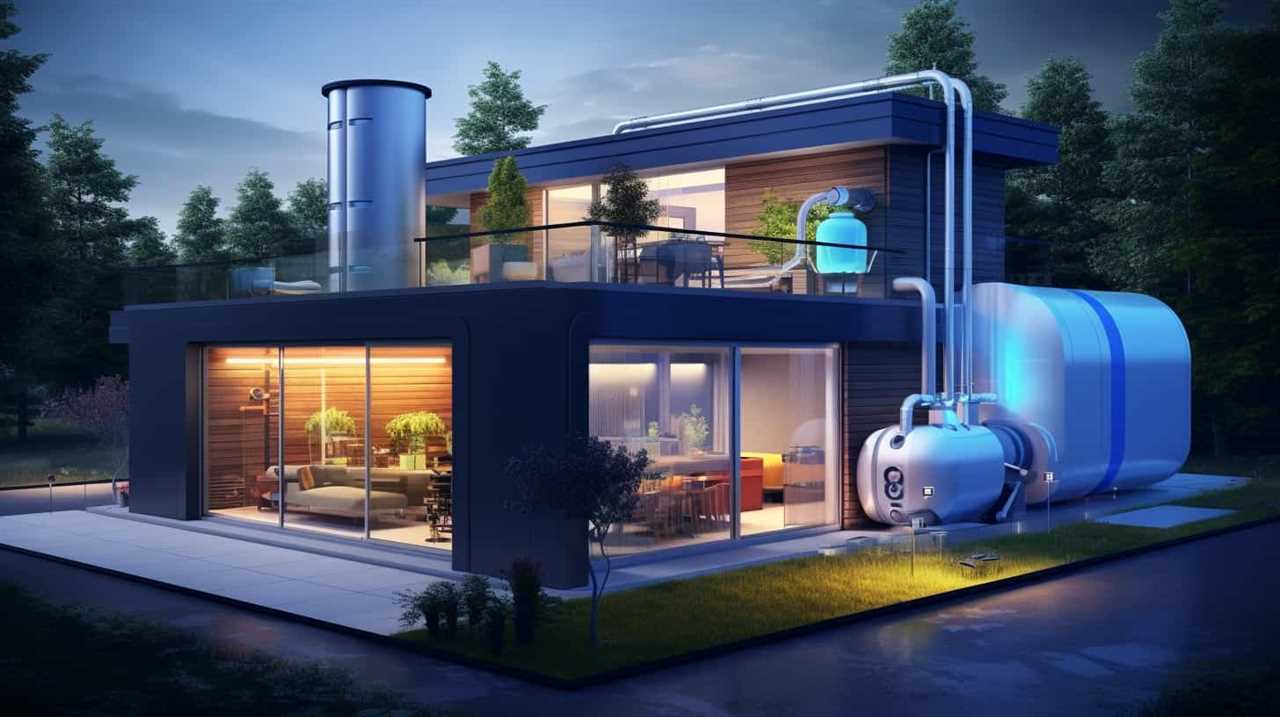
Conclusion
Overall, when comparing heat pumps to traditional heating methods, it’s clear that heat pumps offer significant advantages.
With their higher energy efficiency, cost-effectiveness, and minimal environmental impact, heat pumps paint a picture of a greener and more sustainable future.
By harnessing the power of technology, we can transition away from outdated and inefficient heating systems, symbolizing a shift towards a cleaner and more efficient way of living.
Refrigeration Cycle
Boosting ROI: Energy-Efficient Heat Pumps Expense Analysis

Ladies and gentlemen, get ready as we explore the realm of energy-saving heat pumps and how they affect return on investment (ROI).
In this article, we’ll explore the factors that affect the cost-benefit analysis of heat pump efficiency and analyze the initial expenses involved.
But wait, there’s more! We’ll also calculate the long-term savings these pumps offer and reveal how to maximize ROI through upgrades.
Get ready to revolutionize your energy usage and boost your bottom line!
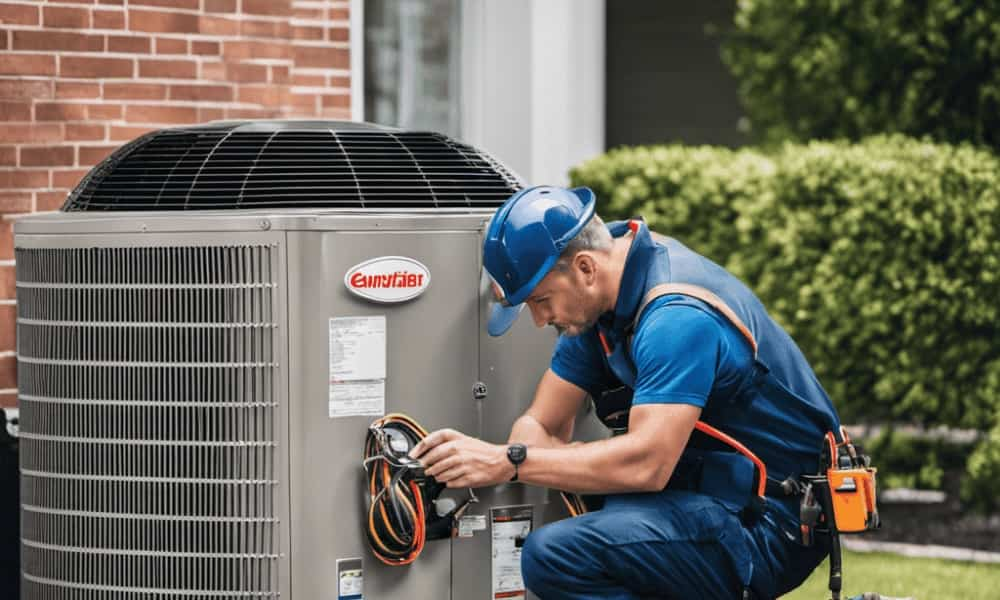
Key Takeaways
- ROI is crucial in determining the value of energy-efficient heat pumps.
- Factors such as energy prices and environmental impact should be considered in the cost-benefit analysis.
- Upfront expenses, maintenance costs, and incentives should be factored in when analyzing the initial expenses.
- Energy-efficient heat pumps can lead to long-term savings through reduced energy consumption and lower utility bills.
The Importance of ROI in Energy-Efficient Heat Pumps
We believe that ROI plays a crucial role in determining the value of energy-efficient heat pumps. For businesses and homeowners alike, it’s essential to consider the financial return on investment when deciding to adopt these innovative solutions.
The importance of ROI becomes even more evident when considering the impact on the environment. Energy-efficient heat pumps not only reduce energy consumption and utility costs but also significantly lower carbon footprint.
This is where government incentives come into play. By providing financial support and incentives for the adoption of energy-efficient heat pumps, governments can encourage individuals and organizations to invest in these environmentally friendly technologies. This not only benefits the environment but also helps businesses and homeowners save money in the long run.
Therefore, understanding the importance of ROI in energy-efficient heat pumps is crucial for making informed decisions and driving innovation in sustainable energy solutions.

Factors Affecting the Cost-Benefit Analysis of Heat Pump Efficiency
When evaluating the cost-benefit analysis of heat pump efficiency, it’s important to consider various factors that can impact the overall financial return on investment. Two key factors that must be taken into account are energy prices and the environmental impact of the heat pump system.
Energy prices play a significant role in determining the cost savings associated with heat pump efficiency. Higher energy prices can result in greater cost savings over time, as the energy-efficient heat pump consumes less electricity compared to traditional heating and cooling systems. On the other hand, lower energy prices may reduce the financial benefits of investing in a heat pump.
Furthermore, the environmental impact of the heat pump system is another important consideration. Heat pumps are known for their lower carbon emissions compared to conventional heating and cooling systems. By reducing reliance on fossil fuels, heat pumps contribute to a greener and more sustainable future. This environmental benefit must be factored into the cost-benefit analysis, as it adds value to the overall return on investment.
Analyzing the Initial Expenses of Energy-Efficient Heat Pumps
To accurately assess the financial viability of energy-efficient heat pumps, it’s essential to analyze the initial expenses involved and their impact on the return on investment. When conducting a cost analysis of energy-efficient heat pumps, the following factors should be considered:

-
Initial Investment: The upfront cost of purchasing and installing an energy-efficient heat pump is a significant expense. It includes the cost of the unit itself, any necessary modifications to the existing HVAC system, and professional installation fees.
-
Energy Savings: Energy-efficient heat pumps consume less electricity compared to traditional heating systems. By quantifying the potential energy savings over the lifespan of the heat pump, the long-term financial benefits can be determined.
-
Maintenance and Repair Costs: It’s important to factor in the ongoing maintenance and repair costs associated with energy-efficient heat pumps. Regular maintenance and occasional repairs are necessary to ensure optimal performance and longevity.
-
Incentives and Rebates: Various government incentives and utility company rebates may be available to offset the initial investment. These incentives can significantly reduce the overall cost and improve the return on investment.

Calculating Long-Term Savings With Energy-Efficient Heat Pumps
Our analysis aims to determine the long-term savings achieved by utilizing energy-efficient heat pumps. When considering the cost of implementing energy-efficient heat pumps, it’s essential to assess the long-term benefits and energy savings that can be achieved.
Energy-efficient heat pumps have the potential to significantly reduce energy consumption and lower utility bills. By utilizing advanced technology and innovative designs, these heat pumps can provide efficient heating and cooling solutions while minimizing energy wastage.
The long-term benefits of energy-efficient heat pumps include reduced energy costs, improved energy efficiency, and decreased environmental impact. These factors contribute to substantial savings over time, making energy-efficient heat pumps a wise investment for both residential and commercial applications.
Maximizing ROI Through Energy-Efficient Heat Pump Upgrades
The key to maximizing our ROI through energy-efficient heat pump upgrades lies in carefully selecting the most cost-effective and technologically advanced options available. By improving efficiency and taking advantage of financial benefits, we can significantly increase our returns on investment.

Here are four strategies to consider when upgrading heat pumps:
-
Conduct a thorough energy audit: Before making any upgrades, assess the current energy usage and identify areas for improvement. This will help determine the most effective upgrades to maximize ROI.
-
Choose high-efficiency heat pumps: Look for heat pumps that have a high SEER (Seasonal Energy Efficiency Ratio) rating and HSPF (Heating Seasonal Performance Factor) rating. These ratings indicate the energy efficiency of the heat pump and can greatly impact energy savings.
-
Consider variable-speed technology: Heat pumps with variable-speed compressors adjust their output based on the heating or cooling needs, resulting in more efficient operation and reduced energy consumption.
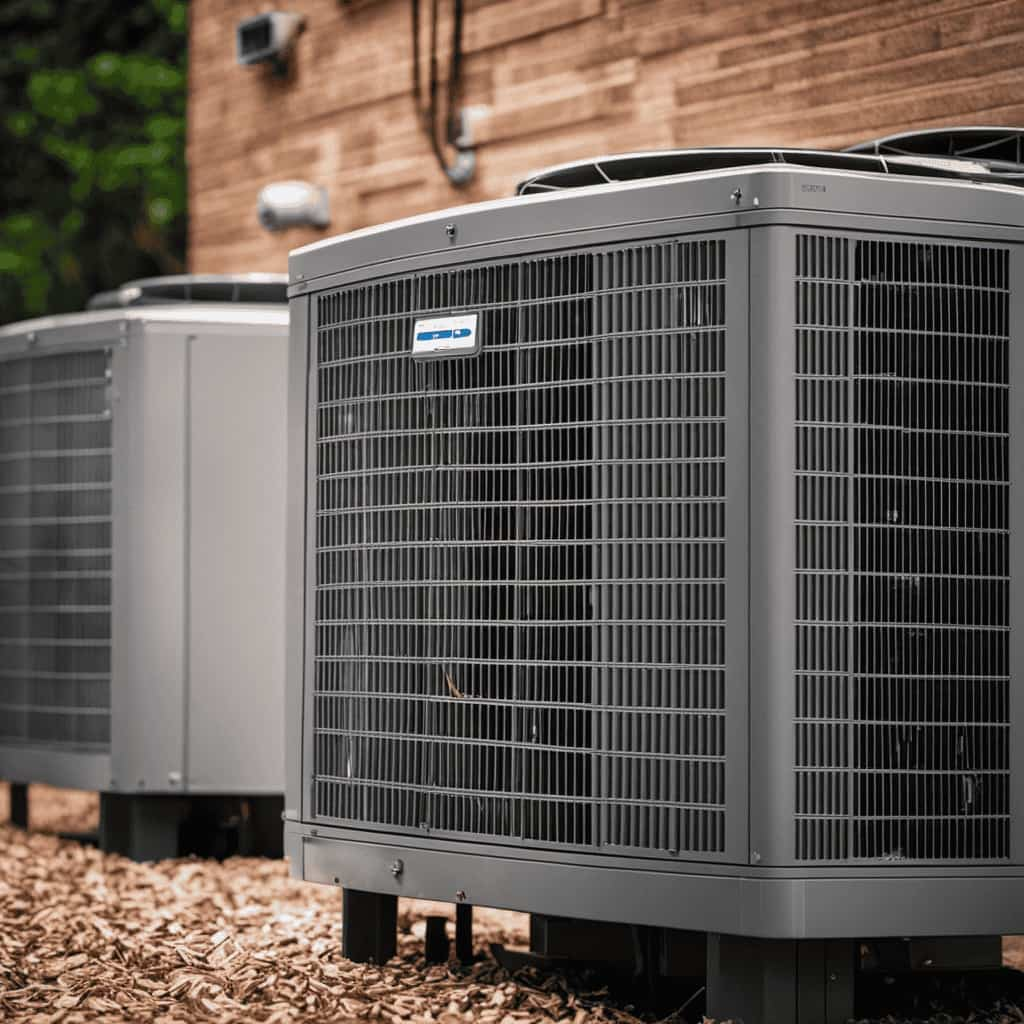
-
Explore financing options: Research available incentives, rebates, and financing programs to offset the initial cost of the upgrades. This can help improve the ROI and make the investment more financially feasible.
Frequently Asked Questions
How Do Heat Pumps Compare to Other Heating and Cooling Systems in Terms of Energy Efficiency?
Heat pumps offer higher energy efficiency compared to other heating and cooling systems. A comparative analysis reveals their lower environmental impact. This innovation provides a technical and analytical solution for boosting ROI and reducing energy expenses.
What Are the Key Factors to Consider When Analyzing the Long-Term Savings of Energy-Efficient Heat Pumps?
When analyzing the long-term savings of energy-efficient heat pumps, key factors to consider include energy savings and maintenance costs. By examining these factors, we can determine the overall return on investment for this innovative technology.
Are There Any Government Incentives or Rebates Available for Installing Energy-Efficient Heat Pumps?
Yes, there are government incentives and rebates available for installing energy-efficient heat pumps. These incentives aim to promote energy savings and make the adoption of such technology more financially feasible for consumers.

How Does the Climate or Geographical Location Affect the Cost-Benefit Analysis of Heat Pump Efficiency?
The climate and geographical location have a significant impact on the cost-benefit analysis of heat pump efficiency. Understanding these factors is crucial when evaluating the potential ROI and determining the most suitable energy-efficient heat pump system.
What Are Some Common Upgrades or Improvements That Can Be Made to Existing Heat Pump Systems to Maximize Roi?
Improving performance and maximizing ROI for existing heat pump systems can be achieved through various retrofit options. Upgrades such as variable speed drives, enhanced controls, and improved insulation can significantly enhance efficiency and reduce operating costs.
Conclusion
In conclusion, by considering the importance of ROI in energy-efficient heat pumps and analyzing the initial expenses as well as long-term savings, it’s evident that maximizing ROI through upgrades is crucial.
Factors affecting the cost-benefit analysis of heat pump efficiency should be taken into account to make informed decisions.

By implementing energy-efficient heat pumps, individuals can enjoy the benefits of reduced energy consumption and increased cost savings.
-

 Residential and Commercial Applications2 weeks ago
Residential and Commercial Applications2 weeks agoBest Amana Heat Pump Reviews
-

 Thermal Energy Transfer2 weeks ago
Thermal Energy Transfer2 weeks agoBreakthroughs in Modern Heat Pump Systems: Thermal Energy Edition
-

 Residential and Commercial Applications2 weeks ago
Residential and Commercial Applications2 weeks agoBest Heat Pump
-

 Geothermal Heat Pumps3 months ago
Geothermal Heat Pumps3 months agoUpgrade Your Comfort with Our Efficient HVAC Systems
-

 Air Conditioning3 months ago
Air Conditioning3 months agoExploring Energy-Efficient Air Conditioning Heat Pumps
-

 Geothermal Heat Pumps3 months ago
Geothermal Heat Pumps3 months agoInnovative Geothermal Heat Pump Manufacturers Revolutionize Energy Efficiency
-

 Thermal Energy Transfer1 month ago
Thermal Energy Transfer1 month agoBoost Your Heat Pump Efficiency: Interactive Guide
-

 Residential and Commercial Applications2 weeks ago
Residential and Commercial Applications2 weeks agoBest Portable Heat Pump Heat & AC










